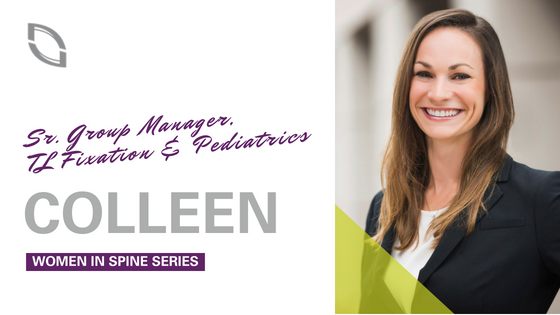This past March, we celebrated International Women’s Day by dedicating a special series for some of our female leaders at NuVasive. What is International Women’s Day (IWD)? It is a global day that celebrates the social, economic, cultural, and political achievements of women all over. In addition, IWD marks a call to action for accelerating gender parity. Internationally, purple is a color for symbolizing women, signifying justice and dignity. At NuVasive, our mission is to paint the world purple and continue to change as many patient lives as possible. Pairing the two purples together, we hope NUVA can help drive the movement to increase unity, advocacy, and action in our society.
Featuring our August #WomenInSpine feature, Colleen, Sr. Group Manager, TL Fixation and Pediatrics

What woman inspires you and why?
There are two women who stand out in my mind: Sheryl Sandberg and Michelle Obama. Sheryl is inspiring because she is not only wildly successful in a fast-paced, technology world, but she is open about how she arrived at, and now manages, that success. She is an advocate for other women and encourages us all to take a “seat at the table” and voice our opinions versus standing in the background. I think that’s admirable. Michelle Obama is successful in a very different way, and remarkably she manages to appeal to all different types of people. I appreciate her focus on children and creating healthy habits at a young age while serving as First Lady of the U.S., as that has been a passion of mine as well.
What advice would you give to other female professionals in Product Marketing?
My advice would be to always be inquisitive but respectful, avoid shortcuts, and practice your emotional intelligence. Our jobs require a lot of patience, coordination, and leading through inspiration. If colleagues in other departments and functions respect how we drive the business (e.g., how we ask questions to arrive at the best possible solutions), then we will ultimately generate an environment of trust where others want to come to us for guidance and support.
What do you think is the most significant barrier to female leadership?
In my opinion, the most significant barrier to female leadership is perception. For example, a strong woman or an assertive woman is often perceived as aggressive or combative, and these are perceptions that are deeply ingrained in our societal structure.
There’s an interesting Harvard Business Review study that provided an identical profile of a leader to two different groups of Harvard business students. The only difference in the profile was whether the leader was given a male or female name. Students were asked to rate whether they would like to work for the leader described in their profile. Overwhelmingly, the male was seen as a strong, confident, assertive leader who the students would like to work for, while the female was perceived as competent but selfish, and someone the students wouldn’t desire to work for.
I don’t believe that perception is insurmountable. As we highlight the respectable traits in competent female leaders and recognize that truly great leadership goes well beyond gender, my hope is that we can overcome those perceptions and gradually change stereotypes about what great leaders look like.
What will be the biggest challenge for the generation of women behind you?
A recent report I heard on NPR noted that women coming out of college still tend to take lower paying jobs than men with the same degrees, which subsequently affected their income opportunities years down the road. So ladies, recognize your worth and stand up for yourselves!
Be proud of your skills and what you know you can accomplish, and do not be afraid to show that you are capable and valuable.
How do you think the female perspective benefits our company mission of changing patient lives?
I think the easy answer to this question is to say “women are more caring, loving, and compassionate, which leads them to care more about patients and outcomes,” but I won’t say that because I don’t necessarily think that’s true. What I do believe is that as long as we all remember why we’re here, to make great products that ultimately affect the quality of people’s lives following surgery, we will continue to be one of the most desirable spine companies to work for in the world.
To read other #WomenInSpine features from last month, click here to browse our ‘Culture’ section.
